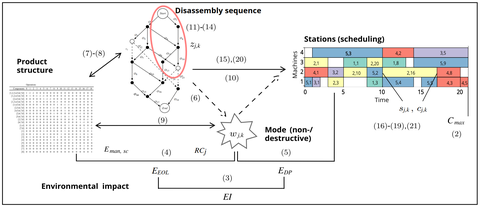20.02.2024
Artikel in 'Computers & Industrial Engineering' veröffentlicht

Visuelle Darstellung des Mathematischen Modells
Das Fachjournal 'Computers & Industrial Engineering' enthält in der Ausgabe März 2024 einen Artikel zum Thema integrierte Demontage- und Ablaufplanung. In dem Beitrag mit dem Titel "Scheduling and process planning for the dismantling shop with flexible disassembly mode and recovery level" formuliert Franz Ehm ein Scheduling Problem für die effiziente und emissionsarme Demontage von Altgeräten unter Berücksichtigung individueller Prozesspläne und Demontagetiefe sowie Anwendung (nicht-) zerstörungsfreier Demontage. Zur Lösung des Problems werden ein modellbasierter inkrementeller Ansatz und ein multikriterieller Genetischer Algorithmus vorgestellt und verglichen.
https://doi.org/10.1016/j.cie.2024.109927
Abstract
The challenges of climate change and resource scarcity have led policymakers around the globe to strengthen the concept of circular economy. Legislation towards extended producer responsibility means that recovery of parts and material from end-of-life (EOL) products is increasingly imposed as a mandatory task for manufacturers across various industries. Consequently, EOL decision-making has emerged as a relevant topic in management science. Recent research has addressed the environmental impact of EOL operations by considering energy usage or carbon emissions from variable disassembly sequences and recovery options. This paper deals with selective disassembly planning and scheduling for multiple products in a dismantling shop and considers the environmental impact that results from the process planning stage. It extends previous formulations by considering flexible disassembly levels and modes. In the multi-objective optimization problem, there is a trade-off between potential time savings, the ecological impact of process-related emissions, and the environmental penalty associated with the recovery of damaged parts, unseparated modules, or unpurified materials. A mathematical formulation is presented and demonstrated using a case study from end-of-life engine disassembly. Next, a multi-objective genetic algorithm (MOGA) is developed and tested using synthetic disassembly problem data. As shown in computational experiments, MOGA outperforms the exact model in more complex problem settings and produces competitive results in a fraction of the time required by the commercial solver.
